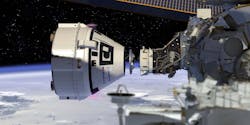Boeing to Remove Starliner from Rocket, Months-Long Delay Expected
Boeing announced Friday that it has to send its troubled CST-100 Starliner capsule to a factory for repairs, delaying an unmanned test flight to the International Space Station (ISS) for several months.
The spacecraft had been due to launch from Cape Canaveral, Florida, on August 3 on an Atlas V rocket built by United Launch Alliance but the flight was delayed because of problems with four propulsion system valves.
Boeing said it would be forced to remove the capsule from the Atlas V rocket and transport it to a factory at the Kennedy Space Center for "deeper-level troubleshooting" of the valves.
John Vollmer, vice president and program manager of Boeing's Commercial Crew Program, told reporters it was "too early to say" if the Starliner launch could still take place this year.
"We'll have to find a slot that will accommodate us," Vollmer said. "We would certainly hope for as early as possible."
Steve Stich, manager of NASA's Commercial Crew Program, noted that NASA has a mid-October launch scheduled for its Lucy asteroid mission and a SpaceX crewed mission to the ISS at the end of that month.
"It's pretty early to speculate on where the flight might end up," Stich said. "We really need to get the vehicle back to the factory."
Boeing's Vollmer said the company "will fly this test when we're ready to fly it and it's safe to do so."
Boeing built the Starliner under contract with NASA to ferry astronauts to low Earth orbit following the end of the Space Shuttle program in 2011.
NASA gave both Boeing and SpaceX multi-billion dollar contracts to provide its astronauts with taxi services to the space station and end US reliance on Russian rockets for the journey.
SpaceX's program has moved forward faster, having now undertaken three crewed missions.
Boeing's program is lagging behind and the aborted Starliner launch is a setback for the company. Boeing needs to complete a successful uncrewed mission before it can carry astronauts.
During an initial unmanned test flight in December 2019, the Starliner capsule experienced glitches with its thrusters. It did not have enough fuel to reach the ISS and had to return to Earth prematurely.
Copyright Agence France-Presse, 2021
About the Author
Agence France-Presse
Copyright Agence France-Presse, 2002-2025. AFP text, photos, graphics and logos shall not be reproduced, published, broadcast, rewritten for broadcast or publication or redistributed directly or indirectly in any medium. AFP shall not be held liable for any delays, inaccuracies, errors or omissions in any AFP content, or for any actions taken in consequence.
